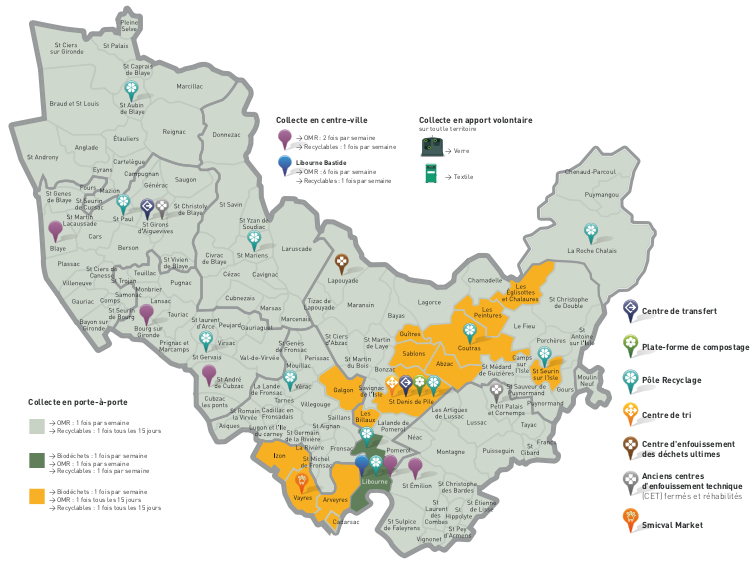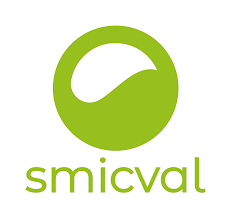SMICVAL
A community dealing with waste management and recovery.
Overview
The Mixed Intermunicipal Syndicate of Collection and Valorization Syndicate of the Libournais Haute-Gironde (SMICVAL) is a community that collects and transports household waste produced in 138 cities of the Libournais in the Gironde, ie more than 200,000 inhabitants.

Map representing SMICVAL activities
SMICVAL has 7 centers and platforms for the collection and treatment of waste.
- Area of 15 ha
- 250 employees
- 12 waste disposal centers
- budget of 30 million euros / year
- twenty or so circular economy projects soon accompanied
- 40 different sorting lines
- 2426 downloads of the application Smicval & You in 2017
- Recycling
project operation
The collection is done door to door or by voluntary contribution, differentiated into 3 categories of waste:
- occasional waste: bulky, vegetal, rubble
- household waste in selective collection:
- recyclable waste → packaging, paper, glass
- fermentable waste → bio-waste for composting
- residual household garbage : waste from artisans, small businesses and administrations, assimilated to household waste.
Door-to-door collection is via the collection of dedicated bins, while the voluntary contribution centralizes the waste to the waste disposal center.
The various waste are sent to the sorting centers and then to the appropriate recovery channels. These channels can be managed by an eco-organization or directly by the community. They concern a large number of products and depending on their nature, their future will be different.

The future of waste (source: smicval.fr)
Zoom on the operation Evolution
Operation Evolution (launched in September 2017) aims to reduce the production of landfill waste and encourage recycling. Now the collection of household and recyclable garbage is done every 15 days and that of bio-waste (corresponding to leftover food) is weekly. In addition, tours have been re-balanced to improve the security of collections and the working conditions of employees.
Future of organic waste: organic compost
Household plants and bio-waste collected are used for the production of organic composts. The compost from the plants is sold to local wineries while that from household bio-waste is sold to individuals.
In numbers, this represents 120,000 tons of organic waste over a year, including 20,000 tons of plants that produce 6,000 tons of compost.
The composition of the organic compost is monitored and checked twice a year by a certified company to certify a biological quality.
For 4 years, the SMICVAL also promotes large organic waste in wood chips.
Becoming of other waste:
Packages:
The various packaging (including those of our food products) are sorted then compacted and collected in blocks for specific recycling plants. This sorting is however not perfect and presents 20% of errors which are:
- reworked to make a fuel that is used in a cement plant
- or crushed and sent to Spain to make a combustible material.
This represents 50kg / inhabitant / year on the 600kg / hab / year produced in the SMICVAL area.
Wood:
The collected wood is sent to the Landes department to make particle boards.
The Smicval market: the reversed supermarket
The SMICVAL has opened its reversed supermarket which is popular in the region. The inhabitants can deposit and take themselves of “waste of each” which are simply the objects and materials that can still be used but not desired and that would have ended in the dump. The idea is to show that what we think is “waste” is actually always resources.
Communication actions
The SMICVAL also carries out communication actions to make aware the population to produce less waste and better sorting. The smartphone application Smicval & You was created in October 2017 in support of Operation Evolution. It informs the users of the days of collection and sends notifications the day before it. A sorting memo was also distributed to each household to summarize and recall the sorting rules.
sustainable approach
- burial reduction and increased sorting thanks to communication actions
- reduction of the amount of waste produced per inhabitant in the SMICVAL area
- to reduce the impact of the SMICVAL activities:
- actions to maintain biodiversity on sorting and collection centers: planting perennial bulbs, installing birdhouses
- leachate treatment and excavation of polluted soil at two old landfills
- ICPE equipment (Classified Installation for the Protection of the environment)
- making the best use of existing resources would result in financial savings at different scales
- in the recycling division: + 64% revenue in 2017 with a 9% drop in tonnages
- changing of view of the population on the concept of waste
limits & future perspectives
The release values in the natural environment due to the SMICVAL activity remain unsatisfactory on certain parameters, even if the impact remains low. Progress is still to be made to limit the environmental impact of the activity of the community even if the latter are not advanced and that we can consider that this impact is offset by all the processes in favor of the environment that realizes the group.
Some activities remain difficult and risky for the SMICVAL agents.
The North-East of the Gironde is considered as a crescent of poverty, which is why the circular economy appears as a real lever of job creation also allowing the preservation of resources. The SMICVAL has decided to create and host an association, named Nouvel’R, which will accompany circular economy projects, such as an incubator, in new premises (the Hot Spot), built from recycled and reused materials at 90%.
The SMICVAL also aims to reinvigorate sorting and deploy new recycling streams.
Glossary
- Leachate : Residual liquid generated by the percolation of water and liquids through a storage area for waste, chemicals or simply soil contaminated by pollutants.

